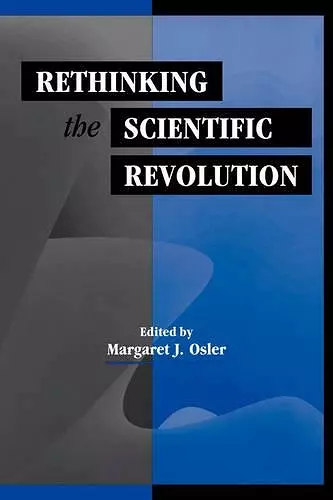Rethinking the Scientific Revolution
Reassessing key figures and ideas from the Scientific Revolution
Format:Paperback
Publisher:Cambridge University Press
Currently unavailable, and unfortunately no date known when it will be back
This paperback is available in another edition too:
- Hardback£105.00(9780521661010)

This collection reexamines the Scientific Revolution, offering fresh insights into key figures and the evolution of scientific disciplines, as explored in Rethinking the Scientific Revolution.
In Rethinking the Scientific Revolution, the authors delve into the complexities and nuances of the Scientific Revolution, challenging long-held beliefs about this pivotal period in the history of science. The collection begins with a thought-provoking dialogue between Betty Jo Teeter Dobbs and Richard S. Westfall, who present differing perspectives on key figures and events that shaped the scientific landscape from approximately 1500 to 1700. This dialogue sets the stage for a series of papers that aim to reevaluate the significance of canonical figures and the boundaries of various disciplines that emerged during this transformative time.
The book argues that the Scientific Revolution is not just a singular event but a complex interplay of ideas, personalities, and societal changes. By examining the contributions of notable scientists and thinkers, the authors shed light on how their work influenced the formation of modern scientific disciplines. The discussions highlight the importance of context in understanding these figures and challenge the notion of a linear progression in scientific thought.
Ultimately, Rethinking the Scientific Revolution invites readers to reconsider the traditional historiography surrounding this era. It encourages a more nuanced understanding of how modern science came to be, emphasizing the diverse influences and interactions that defined the period. This collection is a significant contribution to the ongoing discourse about the evolution of scientific thought and its historical implications.
"This is now the place to look for guidance on whether (and how) we may still speak of a scientific revolution in 17th-century Europe....especially illuminating on contrasts between Boyle and Newton in their alchemy, theology and epistemology. A fitting tribute to Betty Jo Dobbs and Richard S. Westfall, whose competing views set an attractive agenda." John Brooke, Oxford University
"The Scientific Revolution still divides historians into those who see it as an undeniably real period of historical change comparable with the Renaissance and the Reformation, and those who see it merely as a term of convenience for historians of science. In this important new collection each of the authors reassesses the Scientific Revolution, some in the widest possible terms, others by focussing upon one episode or one individual, with a view to redressing this problem. The result should be required reading for all those interested in the formation of the modern world. Margaret Osler has done well to bring together such an impressive group of contributors, from the most promising to the most distinguished." John Henry, University of Edinburgh
"...this is a rich and stimulating collection that shoulf compel any historian to abandon retailing the traditional notion of the 'Scientific Revolution.'" American Historical Review
"...the reader can find here much new information and many interpretations about the roles in the birth of modern science played by lesser known individuals...and by disciplines and topics usually seen now, but not then, as extra-scientific." The Review of Metaphysics
ISBN: 9780521667906
Dimensions: 230mm x 153mm x 21mm
Weight: 485g
356 pages